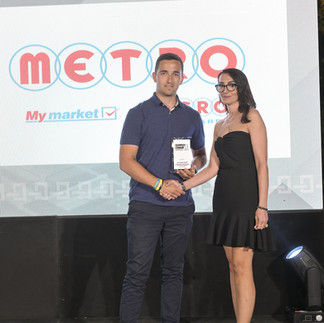Connected Lock - Case Study METRO SA - Silver Award @ Supply Chain Awards 2023
- G4S Telematix

- Jul 7, 2023
- 5 min read
Updated: Jun 27, 2024
Supply chain companies like METRO AEBE face daily challenges in managing vehicles and cargo using plastic seals. G4S Telematix's Connected Lock offers an innovative solution as an advanced remote monitoring system for improved control and security. Its adoption in METRO led to:
Operating Cost Reduction
Time-Saving
Security Improvement
Increase Productivity & Efficiency
Simplifying Processes
Reducing Human Errors
Strengthening Social & Environmental Responsibility
The Connected Lock also enables live monitoring of the location & status of loads, preventing theft and improving overall security. In total, the Connected Lock is an innovative solution, making the supply chain more efficient, secure and sustainable. Below you can read our joint nomination with METRO AEBE at the Supply Chain Awards 2023, which received the Silver Award from the evaluation committee. It analyzes the results and benefits of the application of Connected Lock in the company's vehicles.
A. The need we identified
In today's market, and especially in the field of transport and warehousing in the supply chain, the need for integrated telematics solutions is crucial. Businesses like METRO AEBE face supply chain challenges due to the use of plastic seals to ensure the integrity of goods during transport and storage. This results in difficulties in the daily life of employees, increased costs and uncertain results. Therefore, there is a need for alternative technological solutions that will improve the management and security of goods in transport.
The usual problems arising from the use of plastic seals are:
1. The High Cost:
The use of plastic stamps increases the operating costs of the company, as they cost from €0.1 - €0.5 each, and at least 4 are required on average in each route. This negatively and directly affects the profitability of the company.
2. The Environmental Effects:
The disposable seal is a unit of non-recyclable waste and its daily extensive use contributes directly to the pollution of the environment as it requires the use of petrochemical products for its production.
3. Lack of Consolidated View & Cargo Movement History:
Plastic seals do not provide live information about the location, status of the cargo and other important data such as who sealed & unsealed the cargo area. This affects the management of goods and the ability to deal with potential problems such as theft, damage or delays.
4. Manual process:
Manually applying and removing plastic seals takes more time and manpower. In addition, this process can lead to human error, inconsistencies and falsification of information, as it is difficult to maintain the accuracy of the recording and distribution of data in each location.
5. Own & Subcontractor Vehicle Management:
Managing the fleet of owned and partner vehicles is an ongoing problem for companies. Replacing or renewing a vehicle fitted with installed telematics requires reprogramming & reinstallation of the telematics device and adapting data management, which can lead to delays in logistics processes. Additionally, partners may not want to install a unit to the vehicle and don't want to incur the cost and time loss of installing and compensating them. Additionally, partners do not want vehicles tracked outside of project delivery hours, as they often undertake multiple contracts for different companies.
B. The solution we developed
The Connected Lock solution, a 4G electronic lock/seal with an integrated GPS and high-capacity battery, was implemented in the METRO fleet in order to improve the management and security of deliveries. The implementation of the solution in the daily operations of the company included the following stages:
Report of yesterday's activities:
Supply chain managers automatically receive a report that includes a summary of yesterday's activities, such as routes per vehicle, unlocks, dwell time per point, door open time per point, any security incident, etc.
Access:
Warehouse managers have RFID cards with which they unlock vehicles in the warehouse or store, recording the time, location and identity of the person who unsealed the cargo. In addition, administrators can unlock the Connected Lock remotely with a command via the G4S Mobility platform or mobile app.
Placement:
The unit is plug & play and easily attaches to the truck door with the help of a magnet
Loading and Unloading:
Employees load the vehicles and lock the goods until they arrive at their destination
During distribution:
Function:
Vehicles equipped with Connected Lock transmit their position, direction and speed in real-time to the G4S Mobility platform.
Administrators will be able to monitor and control real-time vehicle progress, stops, performance and driver safety.
Alerts:
For the expected arrival time of the truck
In case of sabotage of the unit or the wire, through the 24/7 Security Center
In case of unlocking outside a store or warehouse
On delivery to stores:
Employees are informed of the expected arrival time and prepare for the arrival of the goods
At the predefined points of interest, the authorized employee can unlock the unit with the RFID card
Delivery of goods
The time of delivery and stay of the vehicle at the store is recorded electronically
There is a lock and an electronic timestamp
C. The results of the application
The Connected Lock electronic seal offers improved control and accuracy in the management of vehicles and cargo throughout the journey, with immediate and easy access to real-time tracking information and historical data. The METRO company has seen multiple benefits and the importance of advanced telematics services for the supply chain is highlighted.
The adoption of the Connected Lock solution presented the following results:
1. Drastic cost reduction:
Replacing plastic seals with the electronic seal eliminates their purchase cost ( ≈ €0.39 per seal) and reduces the total monthly cost per vehicle on average 100 euros. The Return of Investment - ROI, based on the data of the application in the company METRO SA was highlighted at 6 months.
2. Time-saving:
More efficient shipment management and detailed data analysis led to the optimization of routes, reducing time by at least 10% (reduced time handling plastic seals, better preparation for vehicle arrival).
3. Security improvement:
The use of the electronic lock acted as a deterrent, reducing the risk of product theft and allowing immediate notification and detailed investigation in the event of an incident. No incident of theft was observed during the period of use of the electronic stamp.
4. Increased productivity and efficiency:
The automatic recording and analysis of vehicle operation data improves resource management and routing, as well as optimizing routes by reducing downtime per store.
5. Simplifying the process and reducing errors:
The plug & play application and the automation of the recording process of sealings/unsealing reduces the risk of errors and ensures the accuracy of the data.
6. Corporate Social and Environmental Responsibility:
Reducing the use of plastic seals and improved routing lead to a more sustainable operation, reducing the environmental footprint. Quantitatively, eliminating plastic stamps will result in a reduction of 21.6 kg of plastic per vehicle per year or a total of 3,300 kg of plastic or over 15,000 kg of CO2 per year for METRO's vehicle fleet.
Links to more case studies: --> ENG - Connected Lock - How to Mitigate Risks While Using Subcontractors - TAPA Webinar --> GR - Connected Lock - OPTILOG WEBINAR













